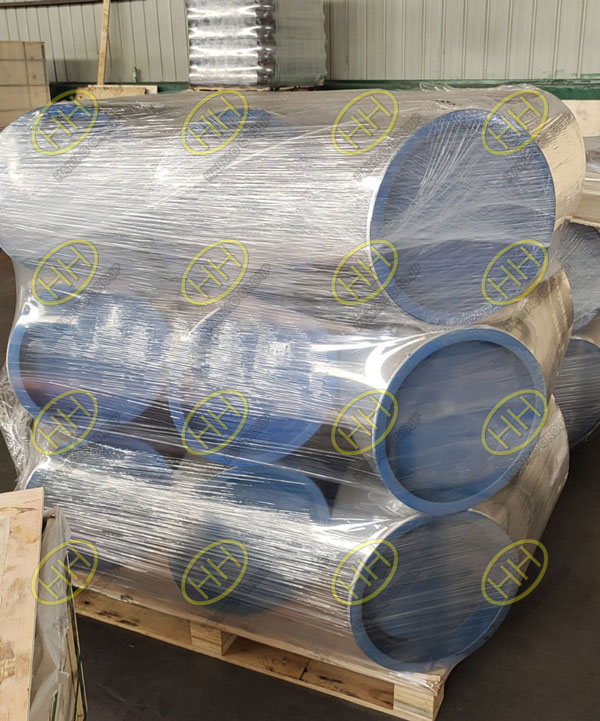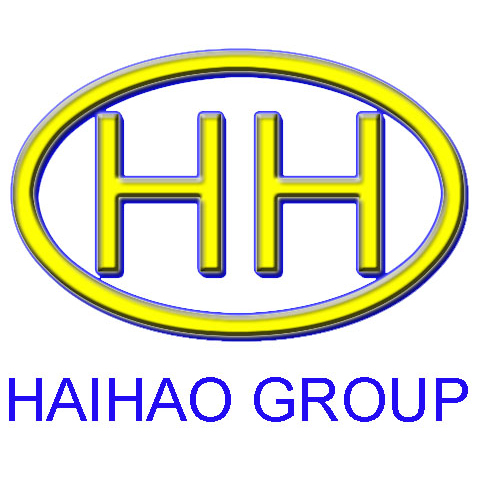Haihao Group manufacturing high-temperature-resistant pipe fittings for nuclear power plants
In the realm of nuclear power generation, every component plays a paramount role in ensuring the safety, operational efficiency, and long-term integrity of the entire facility. At Haihao Group, we specialize in designing and manufacturing nuclear-grade, high-temperature-resistant pipe fittings that meet the most stringent global standards, particularly the ASME Boiler and Pressure Vessel Code (BPVC), Section III. This article delves into the precise material selection, specialized manufacturing processes, rigorous quality assurance, and robust compliance measures that enable our fittings to withstand the extreme and unique demands of nuclear power plant environments.
1. The Unwavering Demands of Nuclear Power: An Operating Environment Unlike Any Other
Nuclear power plants operate under conditions that push material science and engineering to their limits. Pipe fittings in these facilities must not only withstand but also maintain their integrity over decades under:
Extreme Temperatures & Pressures: Components operate at very high temperatures and pressures, particularly within the reactor coolant system (RCS), steam generators, and various auxiliary systems.
Corrosive Environments: The internal environment, involving high-purity water, steam, and sometimes specific chemical additives, can lead to specialized forms of corrosion, such as stress corrosion cracking (SCC) or intergranular attack, which are critical to prevent.
Radiation Exposure: Over their operational lifespan, materials are exposed to neutron and gamma radiation, which can alter their microstructure and mechanical properties, requiring materials with verified radiation resistance.
Long Design Life: Nuclear power plants are designed for continuous operation for 60 years or more. Components must exhibit exceptional long-term stability, creep resistance, and fatigue strength.
Seismic and Dynamic Loads: Fittings must maintain their structural integrity during seismic events and other dynamic loads, ensuring the continued safe operation and containment functions of the plant.
2. Engineering Excellence: Strategic Material Selection for Nuclear Applications
Haihao Group’s material selection process for nuclear-grade pipe fittings is driven by an in-depth understanding of these extreme conditions and strict adherence to ASME Section II (Materials) and ASME Section III (Nuclear Components) requirements. We utilize specific material grades renowned for their superior high-temperature stability, exceptional corrosion resistance, and verified long-term integrity under radiation exposure.
Key Material Categories and Specific Grades:
Austenitic Stainless Steels: Primarily ASME SA-312 / SA-403 Grades WP304/304L and WP316/316L.
Properties: Excellent general corrosion resistance, good ductility, and high-temperature strength. The “L” (low carbon) grades are critical for mitigating intergranular corrosion (weld decay) in the heat-affected zones after welding, ensuring long-term integrity in high-purity water environments.
Nuclear Application: Widely used in the reactor coolant system, auxiliary cooling systems, and balance-of-plant components where corrosion resistance and stability are paramount.
Low Alloy Steels: Such as ASME SA-335 Grades P11, P22, P91/92.
Properties: Superior high-temperature strength, creep resistance, and resistance to hydrogen attack.
Nuclear Application: Employed in main steam lines, feedwater lines, and other high-temperature/high-pressure components, typically outside the primary containment, where creep deformation is a significant concern.
Carbon Steels: Including ASME SA-106 Grade C for pipe and SA-234 Grades WPB/WPC for fittings.
Properties: Good strength and toughness at moderate to elevated temperatures.
Nuclear Application: Used in less critical systems or balance-of-plant applications where operating temperatures and pressures are within their specified limits, always with stringent quality control.
Nickel-Based Alloys: For highly specialized applications requiring extreme corrosion resistance or specific neutron absorption properties, grades like ASME SB-167 / SB-444 UNS N06600 (Inconel 600) or UNS N06625 (Inconel 625) may be used.
Unwavering Material Traceability: Every piece of raw material and every finished fitting is backed by comprehensive Material Test Certificates (MTCs), detailing chemical composition, mechanical properties, and heat treatment records. Full traceability from melt to final product is a non-negotiable requirement for nuclear safety and is meticulously maintained by Haihao Group.

high temperature resistant pipe fittings for nuclear power plants
3. Precision Manufacturing for Nuclear Performance: Processes & Quality Control Beyond the Standard
Manufacturing pipe fittings for nuclear power plants transcends conventional industrial production; it demands an elevated level of precision, rigorous process control, and specialized expertise. Haihao Group’s advanced manufacturing facilities are equipped and certified to handle these exacting requirements.
Advanced Forming Techniques:
Hot Induction Bending: Utilized for large-diameter and thick-walled elbows, ensuring precise bend radii while maintaining uniform wall thickness and optimal material properties through controlled heating and cooling.
Hot & Cold Pressing/Forging: Applied for fittings like tees, reducers, and caps, shaping the material to precise dimensions while enhancing grain structure.
Precision Machining: Critical dimensions, end bevels (for optimal welding preparation), and surface finishes are meticulously machined to exact tolerances, ensuring perfect fit-up and minimizing stress concentrations.
Controlled Welding Procedures (ASME Section IX Qualified):
All welding on our fittings is performed by highly qualified welders following meticulously developed and qualified Welding Procedure Specifications (WPS) in strict accordance with ASME Section IX.
Strict Consumable Control: Welding consumables (e.g., low-carbon filler metals for stainless steels to prevent sensitization) are rigorously controlled to prevent contamination and ensure weld integrity.
Post-Weld Heat Treatment (PWHT): For specific materials (like low alloy steels) and wall thicknesses, PWHT is meticulously performed to relieve residual stresses from welding and improve metallurgical properties, enhancing long-term integrity and creep resistance.
Stringent Cleanliness Protocols: Components for nuclear applications often require extreme cleanliness. We implement rigorous cleaning procedures to prevent contamination, especially for stainless steels, which are highly susceptible to intergranular corrosion from halides or carbon.
4. Unwavering Quality Assurance & Compliance with Nuclear Standards
Compliance with nuclear standards is not just about meeting specifications; it’s about embedding a culture of safety, quality, and excellence into every single stage of manufacturing. Haihao Group operates under a comprehensive Quality Assurance (QA) program specifically developed and tailored for nuclear applications.
ASME Boiler and Pressure Vessel Code (BPVC) – Section III:
This is the cornerstone standard. Haihao Group’s manufacturing and QA processes strictly adhere to ASME Section III, “Rules for Construction of Nuclear Facility Components.” This includes compliance with Subsection NCA (General Requirements for Division 1 and Division 2), and relevant material (SA-), fabrication, and examination requirements for specific component classes (e.g., NB for Class 1, NC for Class 2, ND for Class 3 safety-related components).
While Haihao Group typically supplies fittings to manufacturers who hold ASME N-Stamps (e.g., N, NA, NPT stamps), our internal processes are aligned with the principles and requirements necessary to support such certifications.
Quality Assurance Programs: 10 CFR Part 50 Appendix B & ASME NQA-1:
Haihao Group’s robust QA program is compliant with the stringent criteria outlined in 10 CFR Part 50 Appendix B (Quality Assurance Criteria for Nuclear Power Plants and Fuel Reprocessing Plants) and/or ASME NQA-1 (Quality Assurance Requirements for Nuclear Facility Applications). This demonstrates our commitment to a systematic and controlled approach to quality, encompassing design, procurement, manufacturing, testing, and documentation.
ASTM International Standards: We maintain full compliance with relevant ASTM standards for material specifications, dimensions, and testing methods, as referenced by ASME BPVC Section III.
Nuclear Regulatory Commission (NRC) Guidelines: We understand and strictly adhere to applicable NRC regulations (for U.S. projects) and other national/regional nuclear regulatory requirements (e.g., European Directives), ensuring global project compatibility and safety.
Rigorous Non-Destructive Examination (NDE): Nuclear components require highly stringent examination. Our certified NDE technicians perform:
Ultrasonic Testing (UT): For detecting internal flaws, laminations, and discontinuities in welds and base material, often using advanced techniques like Phased Array UT or TOFD.
Radiographic Testing (RT): For volumetric inspection of welds to detect internal discontinuities, porosity, or inclusions.
Liquid Penetrant Testing (LPT) / Magnetic Particle Testing (MPT): For detecting surface and near-surface flaws and cracks.
Visual Inspection (VT): Performed at multiple stages to ensure surface quality, dimensional accuracy, and proper marking.
Comprehensive Documentation & Traceability: Every component comes with a meticulously compiled documentation package, including Material Test Certificates (MTCs), NDE reports, heat treatment records, and Certificates of Conformance, ensuring complete traceability and auditability – a non-negotiable for all nuclear projects.
5. Haihao Group: Your Trusted Partner for Nuclear-Grade Pipe Fittings
Haihao Group’s expertise in manufacturing high-temperature-resistant pipe fittings for nuclear power plants is founded on a bedrock of precision engineering, stringent quality control, and an unwavering commitment to nuclear safety.
Specialized Manufacturing Capabilities: Our facilities are equipped with the latest technology for forming, welding, and machining complex pipe fittings to the exacting specifications required by nuclear codes.
Dedicated Nuclear QA Program: We operate under a robust quality assurance program that adheres to the principles of ASME NQA-1, ensuring systematic control and verification throughout the entire production lifecycle.
Experienced & Certified Team: Our engineers, metallurgists, and production personnel possess the in-depth knowledge and certifications necessary to navigate the complexities of nuclear component manufacturing and compliance.
Global Project Experience: Our track record of supplying critical components for demanding energy projects worldwide underscores our capability to meet international standards and logistics challenges, providing reliable solutions for your nuclear power initiatives.
Partner with Haihao Group for your nuclear power plant projects, and benefit from our profound commitment to quality, safety, and performance in high-temperature, high-integrity environments. We deliver peace of mind through meticulously manufactured products that meet the world’s most demanding nuclear safety standards.
Contact Haihao Group today for detailed technical consultation, project-specific solutions, or a customized quotation for your nuclear power plant pipe fitting requirements. Let’s build a safer and more sustainable energy future, together.
Email: sales@haihaogroup.com

